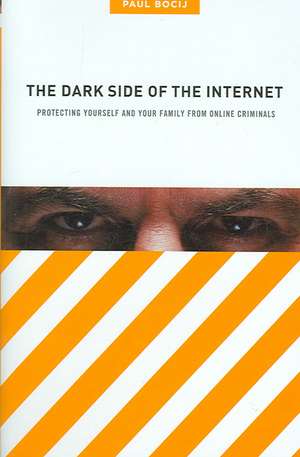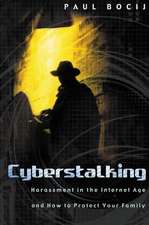The Dark Side of the Internet: Protecting Yourself and Your Family from Online Criminals
Autor Paul Bocijen Limba Engleză Hardback – 29 oct 2006 – vârsta până la 17 ani
Preț: 438.84 lei
Preț vechi: 604.81 lei
-27% Nou
Puncte Express: 658
Preț estimativ în valută:
83.97€ • 89.80$ • 70.01£
83.97€ • 89.80$ • 70.01£
Carte tipărită la comandă
Livrare economică 17 aprilie-01 mai
Preluare comenzi: 021 569.72.76
Specificații
ISBN-13: 9780275985752
ISBN-10: 027598575X
Pagini: 272
Dimensiuni: 156 x 235 x 27 mm
Greutate: 0.58 kg
Editura: Bloomsbury Publishing
Colecția Praeger
Locul publicării:New York, United States
ISBN-10: 027598575X
Pagini: 272
Dimensiuni: 156 x 235 x 27 mm
Greutate: 0.58 kg
Editura: Bloomsbury Publishing
Colecția Praeger
Locul publicării:New York, United States
Notă biografică
Paul Bocij is a published writer of numerous computer training titles and has published articles on various cybercrimes in journals such as The Criminal Lawyer and Prison Service Journal. He is the author of Cyberstalking (Praeger, 2004).
Recenzii
[T]he book provides a highly accessible survey that occasionally and paradoxically enough, even becomes entertaining. All four parts are organized in well-structured chapters in which Bocij first explains what the risk is about, when and how the potential harm might become real, who is causing the potential danger and how readers can ensure their own, their family's or the business' security and safety. In the glossary at the end of the book, Bocij provides clear and concise explanations and definitions of key terms and concepts, and ensures that readers will understand the technical aspects of the Internet as well as the concreteness of the reported risks.
The author introduces the types of threats posed to users of the Internet by the range of criminals and deviants populating the Web. The focus is more on the motivations and behaviors of people and less on technological matters and now prior technical knowledge is required. The author has included greater coverage of neglected areas by sacrificing coverage of topics that have been discussed extensively elsewhere. He presents the material in four sections that deal with cyberterrorism and information warfare; malware (malicious software) and their creators; phishing, e-mail fraud, auction fraud and other forms of identity theft; and issues related to online relationships such as cyberstalking, suicide clubs, and hate speech.
[T]his title provides a useful and comprehensive overview of the unsavory side of the internet, and is recommended for public, college and university libraries.
[C]overs Spy and Adwear, Identity theft, Fraud, Junk E-Mail and much more. If these words mean nothing to you, then this book would be a very good place to start.
The Dark Side of the Internet: Protecting Yourself and Your Family From Online Criminals helps readers recognize the danger signs of internet threats, from spyware to auctions and cyberstalking. Each topic receives in-depth history, overviews of 'how' and discussions of recovery, fraud, and protection measures. A 'must' not just for college-level collections strong in social issues or crime prevention, but for any general-interest library.
The Dark Side of the Internet is an informative crime prevention book.
The threats we encounter online have become almost a part of daily life. Junk e-mail, pop-ups, and adware are nuisances we have to put up with as part of the convenience and access to information that the Internet provides. Bocij goes through the laundry list of these annoyances, explaining the differences among viruses, worms, and Trojan horses; the phishing and pharming e-mail scams; and the infamous Nigerian 4-1-9 scam, which apparently subsidizes a significant portion of Nigerias economy, despite the widespread knowledge of its existence. There is a darker world, however, lurking in chat rooms and on thousands of Web sites catering to every fetish imaginable, and Bocij discusses some of the more sensational and frightening aspects of online relationships..On the bright side, Bocij presents tips for protecting your computer and yourself from online assaults and provides links to numerous free virus-removal tools and other resources to stop online offenders in their tracks.
[A]n easily readable survey covering such topics as malicious software (malware), identity theft and related fraud, cyberstalking, and the possibilities of cyberterror and info warfare. The style is non-technical, but adequately supported by research and references.
The author introduces the types of threats posed to users of the Internet by the range of criminals and deviants populating the Web. The focus is more on the motivations and behaviors of people and less on technological matters and now prior technical knowledge is required. The author has included greater coverage of neglected areas by sacrificing coverage of topics that have been discussed extensively elsewhere. He presents the material in four sections that deal with cyberterrorism and information warfare; malware (malicious software) and their creators; phishing, e-mail fraud, auction fraud and other forms of identity theft; and issues related to online relationships such as cyberstalking, suicide clubs, and hate speech.
[T]his title provides a useful and comprehensive overview of the unsavory side of the internet, and is recommended for public, college and university libraries.
[C]overs Spy and Adwear, Identity theft, Fraud, Junk E-Mail and much more. If these words mean nothing to you, then this book would be a very good place to start.
The Dark Side of the Internet: Protecting Yourself and Your Family From Online Criminals helps readers recognize the danger signs of internet threats, from spyware to auctions and cyberstalking. Each topic receives in-depth history, overviews of 'how' and discussions of recovery, fraud, and protection measures. A 'must' not just for college-level collections strong in social issues or crime prevention, but for any general-interest library.
The Dark Side of the Internet is an informative crime prevention book.
The threats we encounter online have become almost a part of daily life. Junk e-mail, pop-ups, and adware are nuisances we have to put up with as part of the convenience and access to information that the Internet provides. Bocij goes through the laundry list of these annoyances, explaining the differences among viruses, worms, and Trojan horses; the phishing and pharming e-mail scams; and the infamous Nigerian 4-1-9 scam, which apparently subsidizes a significant portion of Nigerias economy, despite the widespread knowledge of its existence. There is a darker world, however, lurking in chat rooms and on thousands of Web sites catering to every fetish imaginable, and Bocij discusses some of the more sensational and frightening aspects of online relationships..On the bright side, Bocij presents tips for protecting your computer and yourself from online assaults and provides links to numerous free virus-removal tools and other resources to stop online offenders in their tracks.
[A]n easily readable survey covering such topics as malicious software (malware), identity theft and related fraud, cyberstalking, and the possibilities of cyberterror and info warfare. The style is non-technical, but adequately supported by research and references.

